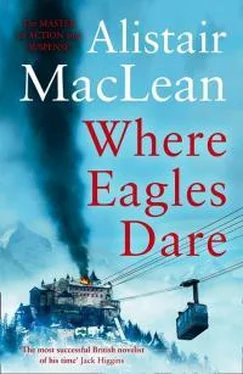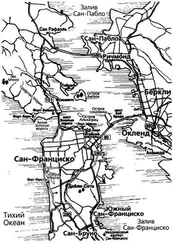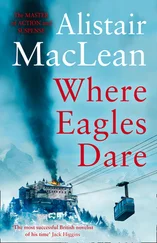And then, and for another reason, he knew that he had no option but to go now: and he knew his prayer hadn’t been answered. The leading door of the cable-car opened and a head and a hand appeared. The head was Carraciola’s: the hand held the Schmeisser. Carraciola was looking upwards even as he leaned out and he saw Smith immediately: he leaned farther out still, swung the Schmeisser one-handedly until the stock rested on his shoulder and squeezed the trigger.
Under the circumstance accurate aiming was impossible but at a distance of four feet accurate aiming was the last thing that mattered. Smith had already let go of the cable and was flinging himself convulsively backward when the first of the bullets ripped off his left hand epaulette. The second grazed his left shoulder, a brief burning sensation, but the rest of the burst passed harmlessly over his head. He landed heavily, stretched out blindly, located and grasped one of the suspension arms and scuttled crab-like round the base of the suspension arm until he had it and what little pathetic cover it offered between him and Carraciola.
For Carraciola was coming after him and Carraciola was coming to make siccar. He had the gun still in his hand and that gun could have very few shells indeed left in the magazine: it would be no part of Carraciola’s plan to waste any of those shells. Even as Smith watched, Carraciola seemed to rise effortlessly three feet into the air – a feat of levitation directly attributable to the powerful boost given him by Thomas and Christiansen – jack-knifed forward at hip level and flattened his body on top of the cable-car roof: his legs still dangled over the leading edge. A suicidal move, Smith thought in brief elation, Carraciola had made a fatal mistake: with neither hand-hold nor purchase on that ice-coated roof, he must slide helplessly over the edge at the first jerk or jolt of the cable-car. But the elation was brief indeed for Carraciola had made no mistake. He had known what Smith hadn’t: where to find a secure lodgment for his hand on the smooth expanse of that roof. Within seconds his scrabbling fingers had found safety – a gash in the cable-car roof that had been torn open by one of the bursts from the Schmeisser. Carraciola’s fingers hooked securely and he pulled himself forward until he was in a kneeling position, his toes hooked over the leading edge.
Smith reached up with his wounded hand and clawed desperately for a grenade in the canvas bag slung over his left shoulder, at the same time pushing himself as far back as his anchoring left hand, clutched round a suspension bracket, would permit: at that range a grenade could do almost as much damage to himself as to Carraciola. His legs slid back until his feet projected over the trailing edge and he cried out in pain as a tremendous pressure, a bone-breaking, skin-tearing pressure, was applied to his shins, half-way between knees and feet: someone had him by the ankles and that someone seemed determined to separate his feet from the rest of his body. Smith twisted his head round but all he could see was a pair of hands round his ankles, knuckles bone-white in the faint wash of moonlight. And no one man’s weight, Smith realized, could have caused that agonizing pain in his shins. His companion must have had him by the waist, whether to increase the pressure or to ensure his safety if Smith did slide over the end. The reasons were immaterial: the effect was the same. He tried to draw up his legs but with a pinning weight of well over 200 lbs, any movement was quite impossible.
Smith risked a quick glance forward, but Carraciola hadn’t moved, the cable-car was now half-way between the header station and the top pylon, the pendulum swing was at its maximum and Carraciola, still in his kneeling position, was hanging on for his life. Smith abandoned his attempt to reach for a grenade which could now serve no purpose whatsoever, unsheathed his knife, clasped the haft in the three good fingers of his right hand, twisted round and tried to strike at those hands that were causing him such excruciating agony. He couldn’t get within fifteen inches of them.
His legs were breaking: his left arm was breaking: and his clenched grip on the support was slowly beginning to open. He had only seconds to go, Smith knew, and so he had nothing in the world to lose. He changed his grip on his knife, caught the tip of the blade between his broken thumb and the rest of his fingers, turned and threw the knife as powerfully and as accurately as his smashed hand and pain-dimmed eyes would permit. The stinging pain in his left ankle and the scream of pain from the trailing door were simultaneous: immediately, all the pressure on his ankles vanished: a second later, Christiansen, whom Thomas had managed to drag back inside the cable-car, was staring stupidly at the knife that transfixed his right wrist.
In that one instant Smith had won and he had lost. Or so it most surely seemed, for he was defenceless now: Carraciola had bided his time, calculated his chances and flung himself forward until he had reached the safety of the suspension bracket. Now he pulled himself slowly to his feet, his left arm round the suspension arm itself, his left leg twined securely round one of the brackets. The Schmeisser pointed into Smith’s face.
‘Only one bullet left.’ Carraciola’s smile was almost pleasant. ‘I had to make sure, you see.’
Perhaps he hadn’t lost, Smith thought, perhaps he hadn’t lost after all. Because of the pinioning effect of Christiansen’s hands on his ankles he’d been unaware, until now, how much less difficult it had become to maintain position on that ice-sheathed roof, unaware how much the pendulum swaying of the cable-car had been reduced. And it seemed that, even now, Carraciola was still unaware of it, or, if the change of motion had registered with him, the reason for it had not. With a conscious effort of will Smith shifted his by now half-hypnotized gaze from the staring muzzle of the Schmeisser to a point just over Carraciola’s shoulder. The suspension arm of the first pylon was less than twenty feet away.
‘Too bad, Smith.’ Carraciola steadied the barrel of his machine-pistol. ‘Comes to us all. Be seeing you.’
‘Look behind you,’ Smith said.
Carraciola half-smiled in weary disbelief that anyone should try that ancient one on him. Smith glanced briefly, a second time, over Carraciola’s shoulder, winced and looked away. The disbelief vanished from Carraciola’s face as if a light had been switched off. Some sixth sense or instantaneous flash of comprehension or just some sudden certainty of knowledge made him twist round and glance over his shoulder. He cried out in terror, the last sound he ever made. The steel suspension arm of the pylon smashed into his back. Both his back and inter-twined leg broke with a simultaneous crack that could have been heard a hundred yards away. One second later he was swept from the roof of the cable-car, but by that time Carraciola was already dead. From the open rearward door of the car, Thomas and Christiansen, their shocked faces mirroring their stunned disbelief, watched the broken body tumbling down into the darkness of the valley below.
Shaking like a man with the ague and moving like an old man in a dream, Smith slowly and painfully hauled himself forward until he was in a sitting position with an arm and leg wound round one of the after arms of the supporting bracket. Still in the same dream-like slow motion he lifted his head and gazed down the valley. The other cable-car, moving up-valley on its reciprocal course, had just passed the lower-most of the three pylons. With luck, his own cable-car might be the first to arrive at the central pylon. With luck. Not, of course, that the question of luck entered into it any more: he had no options or alternatives left, he had to do what he had to do and luck was the last factor to be taken into consideration.
Читать дальше
Конец ознакомительного отрывка
Купить книгу










